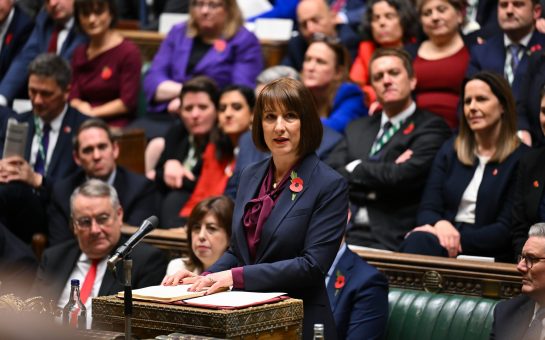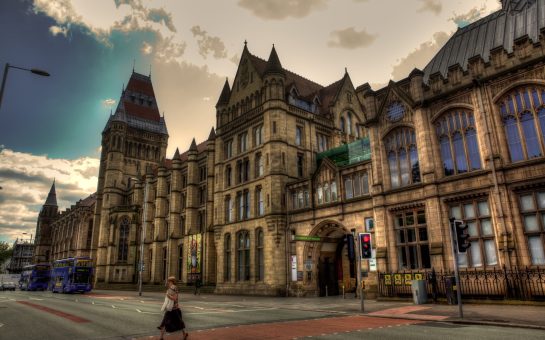‘Manctopia: Billion Pound Property Boom’ has revealed that less than 20% of properties being built in Greater Manchester are classed as ‘affordable’.
The show, which airs on BBC2, describes the city as one of the fastest-growing in Europe, overstepping London in its ability to attract deep-pocketed property investors lured in by quick returns.
Buildings are turning into expensive assets, pricing out Mancunians and low-income individuals and families.
The growth in investment has seen rents skyrocket by as much as 40% over the last five years.
One penthouse apartment on the show boasts a hefty £1.4m price tag, costing a jaw-dropping £8,000 a month to rent.
The backdrop to this property boom is a housing crisis.
The Times has reported that 15,000 people in Manchester are on the waiting list for social housing, with 5,564 currently homeless according to the charity Greater Together Manchester.
The network of campaigners, community organisers and academics at Greater Manchester Housing Action are advocating solutions to the housing crisis.
Mancunian Matters spoke to GM Housing Action spokesperson, Isaac Rose, to find out what the boom means for Manchester’s residents.
He said: “People on low incomes will be unable to rent in Manchester and will be forced out to the peripheral boroughs, as well as suburbs of Manchester itself.
“Most of the developments happening in the city centre, are driving up land value which has a knock-on effect on affordability, both to rent and to buy.
“I think also for the neighbourhoods that are in the city centre… this development will create pressures and displacement for existing communities, and gentrification as the development expands out from the city centre.”
So who’s buying these properties?
“A lot of new builds are sold off plan to investors in China or the Middle East as investment opportunities. Capital & Centric have got good headlines because they offered to Mancunians first,” says Rose.
The co-founder of Capital & Centric, property developer Tim Heatley, who appears on the show, has claimed the company sells directly to private buyers rather than investors.
Heatley is also the chair of the Greater Manchester Mayor’s Charity, which funds a number of causes, including the Bed Every Night scheme, which has invested £2m to tackle homelessness.
The Mayor, Andy Burnham, has promised to “focus on tackling the housing crisis and ensure truly affordable housing is available for everyone in Greater Manchester”.
Burnham has also pledged to end rough sleeping in the city.
Manchester City Council has meanwhile been accused of bypassing affordable housing provision in favour of swanky skyscrapers.
“Their economic strategy has been to inflate the property market to revive Manchester’s economy,” says Rose.
“Perhaps there was merit to this strategy in the nineties and the noughties but now is it going too far and where will it end up? Displacement and people moving out of the city?
“The council could also be a lot more proactive at using public land that it owns to develop social housing, as opposed to giving it away to developers for cut-price values, which they have done in some cases.”
“Their own planning frame works say that they should be aiming for 20% affordable housing on every site, so they should be forcing developers to either provide that on site, in exchange for planning permission, or properly collecting Section 106, that they can then use to fund the construction of social housing in the city.”
Section 106 payments are a contribution from developers towards social housing, Rose explains.
Heatley, the chair of the Bed Every Night scheme, meanwhile admits his property development company is yet to build any affordable houses.
“He’s [Heatley] clearly trying to whitewash his image and paint himself as a good guy. Crusader Mill, by Piccadilly, is obviously one of his big developments and forced out the largest artist studios outside of London, Rogue Studios.”
“I think he’s very much on a charm offensive basically. His record of building social and affordable housing doesn’t exist and his Section 106 payments are minimal,” Rose saif.
The Times has reported that Capital & Centric are set to build 881 flats at Crusader Mill, Kampus, and Talbot Mill, with some costing over a million.
Planning documents reportedly reveal that Crusader Mill and Kampus will not make any S106 payments, while Talbot Mill, which contains 200 luxury flats, will provide £50,000 in S106 payments.
Heatley is rebranding the land where Crusader Mill is situated, next to Piccadilly train station, “Piccadilly East”- at a cost of £2m a week.
The programme shows Heatley visiting one of the sites in the area. He’s faced with a plank of wood advertising blow jobs for £4.99.
The makeshift sign he discovers is accompanied by condoms and a dead rat.
Heatley tells the camera: “You can literally stand here, and you can see a sex worker and you can see our building next to it [sic]. It does make you think, ‘crikey we’re selling apartments here some for upwards a million quid’…and obviously it’s right next to that kind of activity.”
He takes a moment to consider and then adds: “This area is changing really quickly. You kind of like feel the city bashing up against itself.”
The programme later shows Heatley attending a speech by the Mayor, who discusses the Bed Every Night campaign. As chair of the scheme Heatley is responsible for organising fundraising events.
Also in attendance is Judith Vickers, a Homeless Charity Worker, she comments: “I think it’s a bit ironic really that a property developer is running the mayor’s charity. But we’ll have to see because sometimes they have lots of clout, but you can’t help but laugh at the irony.”
What’s in it for you? Heatley is asked by the cameraman.
“I feel less guilty that I’m helping out a bit. So, from a selfish personal perspective, I feel like I’ve done my bit.”
Viewers of the programme were less than impressed by his charitable offerings.
I know people have to make money but surely the property developer could build some affordable housing for those that need it instead of heading the homeless charity to salve his own conscience? #Manctopia #Manchester @BBCTwo
— Leeanne (@leetothegee) August 18, 2020
#Manctopia illustrates a common self-deception & common dissonance amongst those contributing to social problems. Devote their career to building & selling housing for the very rich, creating homelessness & inequality, but do a fundraiser & wahey, their conscience is cleared
— Edward Dickinson (@E_Dickinson86) August 18, 2020
When asked whether homelessness is bad for business, Heatley’s answer admittedly doesn’t scream charity man.
“Yes, absolutely homelessness is bad for business because who wants to live in a city where there are people sleeping rough in your doorway?
“The reality is with so many more people living in the city centre and so much more development happening it’s kind of like you uncover more homelessness, you uncover more squatters, you uncover more rough sleeping… it’s kind of like as you go through with a sweeping broom trying to regenerate and improve and make the areas look nice again, the dust that throws up is evident.”
Should a developer be the mayor’s lead on homelessness when he talks about sweeping away homeless people as dust?#manctopia pic.twitter.com/0RWb0Bg2hU
— Greater Manchester Housing Action (@gmhousingaction) August 19, 2020
According to the programme Manchester’s population is due to double in the next five years.
In a bid to combat the housing crisis, Andy Burnham is reportedly calling for central government to subsidise councils and private developers seeking to build affordable housing.
Heatley has meanwhile spoken of his ambition “to make a building which is 100% affordable housing.”
Watch this space.
Tomorrow from 9pm, #Manctopia starts on @BBCTwo. pic.twitter.com/1cN7PbIDeN
— BBC North (@BBCNorthPR) August 17, 2020



